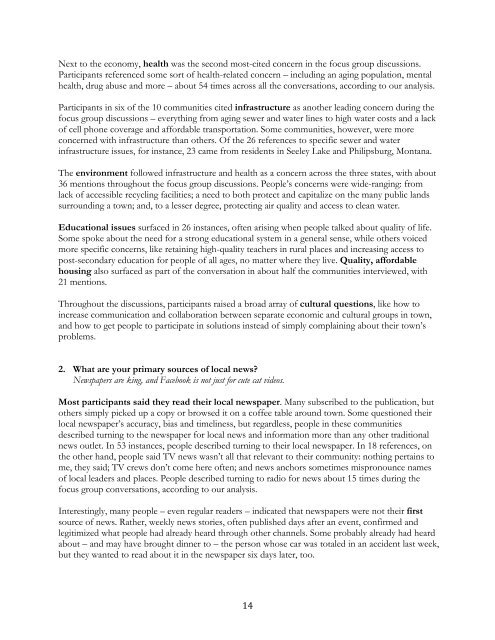Mountain News Deserts
Community-news-audit
Community-news-audit
Create successful ePaper yourself
Turn your PDF publications into a flip-book with our unique Google optimized e-Paper software.
Next to the economy, health was the second most-cited concern in the focus group discussions.<br />
Participants referenced some sort of health-related concern – including an aging population, mental<br />
health, drug abuse and more – about 54 times across all the conversations, according to our analysis.<br />
Participants in six of the 10 communities cited infrastructure as another leading concern during the<br />
focus group discussions – everything from aging sewer and water lines to high water costs and a lack<br />
of cell phone coverage and affordable transportation. Some communities, however, were more<br />
concerned with infrastructure than others. Of the 26 references to specific sewer and water<br />
infrastructure issues, for instance, 23 came from residents in Seeley Lake and Philipsburg, Montana.<br />
The environment followed infrastructure and health as a concern across the three states, with about<br />
36 mentions throughout the focus group discussions. People’s concerns were wide-ranging: from<br />
lack of accessible recycling facilities; a need to both protect and capitalize on the many public lands<br />
surrounding a town; and, to a lesser degree, protecting air quality and access to clean water.<br />
Educational issues surfaced in 26 instances, often arising when people talked about quality of life.<br />
Some spoke about the need for a strong educational system in a general sense, while others voiced<br />
more specific concerns, like retaining high-quality teachers in rural places and increasing access to<br />
post-secondary education for people of all ages, no matter where they live. Quality, affordable<br />
housing also surfaced as part of the conversation in about half the communities interviewed, with<br />
21 mentions.<br />
Throughout the discussions, participants raised a broad array of cultural questions, like how to<br />
increase communication and collaboration between separate economic and cultural groups in town,<br />
and how to get people to participate in solutions instead of simply complaining about their town’s<br />
problems.<br />
2. What are your primary sources of local news?<br />
<strong>News</strong>papers are king, and Facebook is not just for cute cat videos.<br />
Most participants said they read their local newspaper. Many subscribed to the publication, but<br />
others simply picked up a copy or browsed it on a coffee table around town. Some questioned their<br />
local newspaper’s accuracy, bias and timeliness, but regardless, people in these communities<br />
described turning to the newspaper for local news and information more than any other traditional<br />
news outlet. In 53 instances, people described turning to their local newspaper. In 18 references, on<br />
the other hand, people said TV news wasn’t all that relevant to their community: nothing pertains to<br />
me, they said; TV crews don’t come here often; and news anchors sometimes mispronounce names<br />
of local leaders and places. People described turning to radio for news about 15 times during the<br />
focus group conversations, according to our analysis.<br />
Interestingly, many people – even regular readers – indicated that newspapers were not their first<br />
source of news. Rather, weekly news stories, often published days after an event, confirmed and<br />
legitimized what people had already heard through other channels. Some probably already had heard<br />
about – and may have brought dinner to – the person whose car was totaled in an accident last week,<br />
but they wanted to read about it in the newspaper six days later, too.<br />
14"


